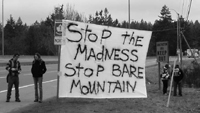The frustration with unchecked sprawl, First Nations disempowerment, and luxury accommodation built on habitat destruction came home to roost at Langford’s Bear Mountain development adjoining Goldstream Provincial Park on Vancouver Island inFebruary.
Tree sitters, some of them forest defenders with a track record from the parking lot struggle at Cathedral Grove, had occupied the site of a required highway interchange for the 2500 unit project in April 2007. They cited the need to stop sprawl and the need to protect a limestone cave with an underground lake, as well as wetland and Garry Oak habitat.
Ultimately however, they clarified the situation in “A Treesit Communique:”
“We are opposed to the political and economic system that places private property rights, and short term financial gain over everything else. We oppose the management society dominated by car culture that ceaselessly continues to grow and dominate the earth….Developers must not be allowed to dictate our future.” It was a declaration of war with non-violent tactics.
On February 13th 2007, a dawn raid by police resulted in a few arrests, but ramped up the civil disobedience, with students joining the call for a Hundred Voices of Conscience to execute “mass, peaceful, direct action.” Contractors hastily cut trees so that the focus of the unrest was removed.
However, the larger issues of abuse of process and a decade of manipulations leading up to the deluxe “mountain top removal” construction, with two golf courses, a hotel and restaurants, condos, townhouse and million-dollar single residences, continue to reverberate. In February as the treesit still reeled from the fast-acting police raid, Vancouver partner Robert Quigg, who had plans for 1,000 luxury condominiums in four towers on Skirt Mountain adjacent to Bear Mountain, filed a suit against the development. The suit, quickly dropped, charged lack of timely delivery of the highway connector, as well as numerous other charges around sales of parcels of land.
History professor and activist Ben Isitt promptly wrote to the local CanWest newspaper, charging the Times Colonist paper had failed over the years to cover numerous “unseemly details relating to the Bear Mountain land assembly and interchange project.” Bear Mountain had been under discussion with Western Forest Products, which owned the majority of the land since 1998, but after the BC Liberal government was elected in 2001, the land assembly proceeded quickly.
Isitt cited the blurring of public and private interests, including “the granting of 243 acres of Crown land originally slated for Goldstream Provincial Park without public disclosure or open tendering; the removal of 35 acres of land from the Forest Land Reserve, following a lastminute plea to BC cabinet minister Stan Hagen; the sale of 180 acres of Skirt Mountain land, part of the site, by Langford councillor John Goudy, with the promise of “$10,000 for every lot sold” and Goudy’s later participation in Bear Mountain Interchange decision-making…”
The taxpayers of Langford may have questions of their own when they realize that their council approved borrowing $25 million for the developer to complete the interchange. Such large sums are frequently subject to referendum and the residents of Langford with help from others had collected enough signatures on a “mock petition” to require that step. The signatures included those of people who live in the Bear Mountain development. The Municipal Finance Authority turned down permission for the loan.
***
See: Ben Isitt, Langford’s Bear Mountain Interchange: Urbanization on the Western Frontier and the Blurring of Public and Private Interests, December 2007. www.treesit.blogspot.com
